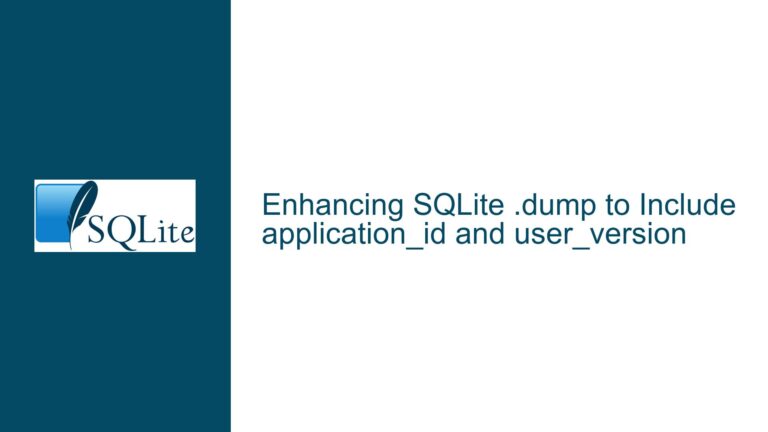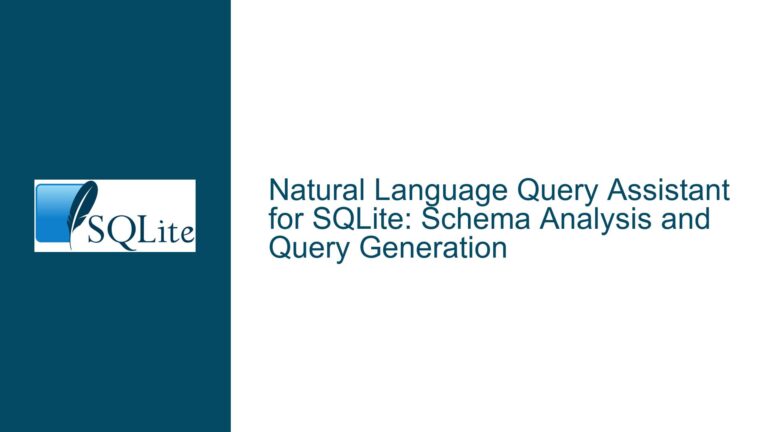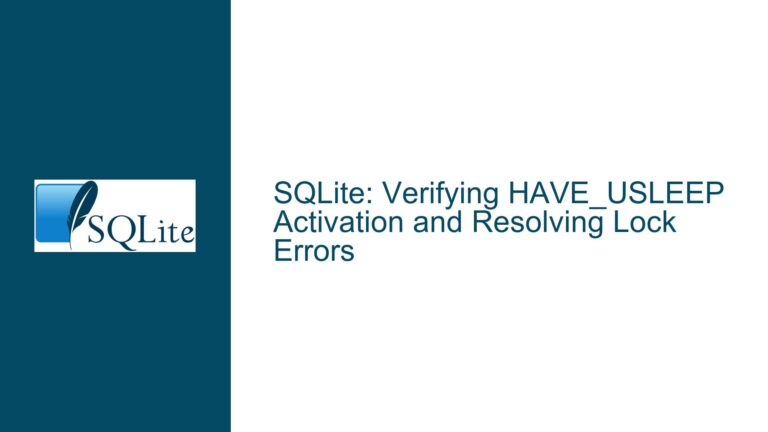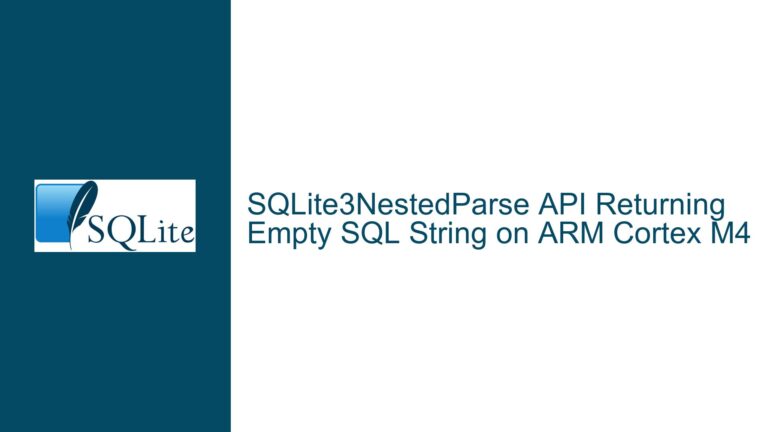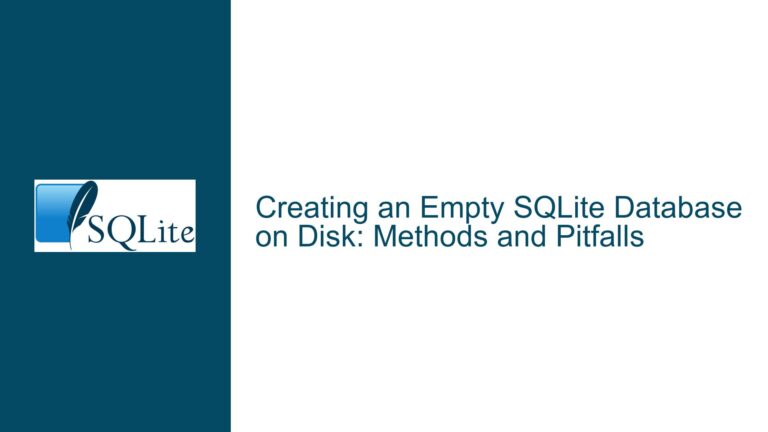Resolving “Unknown Message 0x8C” Error in SQLite3-Rsync on Windows
Issue Overview: Protocol Corruption During SQLite3-Rsync Synchronization
The core issue revolves around the SQLite3-rsync utility failing to synchronize two SQLite database files on Windows 11, returning the error "Unknown message 0x8C 148 bytes into conversation." This error indicates a protocol violation during the rsync-like synchronization process, where the origin and replica processes exchange a sequence of messages to reconcile database differences. The failure occurs specifically during the hash exchange phase, where one side of the communication receives an unexpected byte (0x8C) that does not conform to the expected message format.
The problem manifests exclusively on Windows systems, even when using precompiled binaries or custom builds of SQLite3-rsync. The same databases synchronize successfully on Unix-like systems, confirming the issue is platform-specific. Key observations include:
- The error occurs at varying byte offsets (e.g., 148, 295, 946) depending on the database content.
- Compilation methods (GCC, Visual Studio) and SQLite3 source versions (amalgamation vs. repository checkout) do not resolve the issue.
- The error persists across different Windows 11 devices, ruling out hardware-specific corruption.
The SQLite3-rsync protocol operates by forking two processes: an origin (the source database) and a replica (the target). These processes communicate via pipes or sockets to exchange metadata, page hashes, and deltas. The 0x8C byte violates the protocol’s message structure, which expects specific control codes (e.g., H for hash, P for page data). This corruption disrupts synchronization and halts the process prematurely.
Possible Causes: Platform-Specific File Handling and Protocol Assumptions
The root cause lies in Windows’ handling of file streams and process communication, specifically how binary data is treated in standard input/output (stdio) pipelines. Below are the primary factors contributing to the error:
1. Text vs. Binary Mode in File/Stream Operations
Windows distinguishes between text and binary modes when opening files or streams. In text mode ("r" or "w"), the runtime performs automatic conversions:
- Line endings:
\n(LF) is converted to\r\n(CRLF) on write, and vice versa on read. - Ctrl+Z (EOF) handling: A
0x1Abyte (Ctrl+Z) in text mode signals end-of-file, truncating input.
SQLite3-rsync, designed for Unix-like systems, initially used text mode (fopen(..., "r")) for pipe communication. On Windows, this caused unintended byte modifications (e.g., 0x0A → 0x0D 0x0A) or premature stream termination due to 0x1A bytes in database pages. These alterations corrupted the protocol messages, leading to unrecognized bytes like 0x8C.
2. Fork/Exec Model Limitations on Windows
Unix-like systems use fork() to create child processes, inheriting file descriptors. Windows emulates this with CreateProcess(), but stdio handles require explicit configuration. SQLite3-rsync’s origin and replica processes communicate via anonymous pipes, which on Windows are subject to buffering and mode-specific behavior. If one process writes in binary mode and the other reads in text mode, data integrity is compromised.
3. Database-Specific Byte Patterns
The error’s variable offset suggests the corruption depends on database content. Pages containing bytes like 0x0A, 0x0D, or 0x1A are more likely to trigger text-mode conversions. For example:
- A database page with
0x0Aat position 148 would be converted to0x0D 0x0Ain text mode, shifting subsequent bytes and causing misalignment. - A
0x1Abyte in a BLOB column could truncate the stream, leaving partial messages.
Troubleshooting Steps, Solutions & Fixes: Ensuring Binary Integrity on Windows
1. Enforce Binary Mode in File and Stream Operations
Modify SQLite3-rsync’s code to explicitly open pipes in binary mode on Windows:
// In originSide() and replicaSide() functions:
#ifdef _WIN32
FILE *in = fdopen(fdIn, "rb"); // Read in binary mode
FILE *out = fdopen(fdOut, "wb"); // Write in binary mode
#else
FILE *in = fdopen(fdIn, "r");
FILE *out = fdopen(fdOut, "w");
#endif
This prevents LF/CRLF conversions and Ctrl+Z handling. Recompile the tool after applying this change.
Verification:
- Use a hex editor to inspect the synchronized database. Compare byte-for-byte with the origin.
- Insert debug prints in
originSide()andreplicaSide()to log raw bytes sent/received.
2. Use Precompiled Binaries or Correct Build Commands
Avoid custom compilation pitfalls by:
- Downloading the official
sqlite-tools-win-x64-*.zipfrom sqlite.org/download, which includes a prebuiltsqlite3_rsync.exewith Windows fixes. - Building from source using the recommended command:
nmake /f Makefile.msc sqlite3_rsync.exeThis ensures compatibility with Windows’ C runtime and linker settings.
Troubleshooting Build Issues:
- If
nmakefails, ensure the Visual Studio Build Tools are installed, and the environment is initialized (e.g., runvcvarsall.bat). - Confirm
SQLITE_ENABLE_DBPAGE_VTABis defined to enable thedbpagevirtual table, required by SQLite3-rsync.
3. Validate Database Integrity and Content
Although the databases work on Unix, validate them for hidden corruption:
sqlite3 origin.db "PRAGMA integrity_check;"
sqlite3 replica.db "PRAGMA quick_check;"
If errors appear, repair the databases with .clone or .recover commands before resyncing.
Handling Problematic Byte Patterns:
- Identify pages containing
0x0A,0x0D, or0x1Ausing:SELECT pgno FROM dbpage('origin.db') WHERE data LIKE '%' || char(10) || '%'; - For testing, create a minimal database that reproduces the error:
CREATE TABLE test (content BLOB); INSERT INTO test VALUES (X'8C'); -- Insert problematic byte
4. Debugging Process Communication
On Windows, debug the origin and replica processes simultaneously:
Attach to Both Processes in Visual Studio:
- Launch the origin process (
sqlite3_rsync origin.db replica.db) and note its Process ID (PID). - In Visual Studio, go to Debug > Attach to Process and select the origin PID.
- Repeat for the replica process (spawned by the origin).
- Launch the origin process (
Set Breakpoints in Communication Functions:
- Breakpoint
readMessage()andwriteMessage()insqlite3_rsync.cto inspect raw bytes. - Use the Memory Window (Visual Studio) to view the exact bytes sent/received.
- Breakpoint
Log Communication to Files:
Redirect stdio to files for post-mortem analysis:#ifdef _WIN32 freopen("origin_in.log", "rb", stdin); freopen("origin_out.log", "wb", stdout); #endif
5. Platform-Specific Workarounds and Alternatives
If issues persist:
- Use WSL (Windows Subsystem for Linux): Run SQLite3-rsync in a Unix environment on Windows.
- Alternative Sync Tools: For non-production use, consider
rsync --inplaceorsqlite3 .clone.
By addressing Windows-specific file handling, ensuring correct build procedures, and validating data integrity, the "Unknown message 0x8C" error can be systematically resolved. The fixes have been upstreamed to SQLite’s repository, and updated binaries are available for seamless synchronization on Windows.

